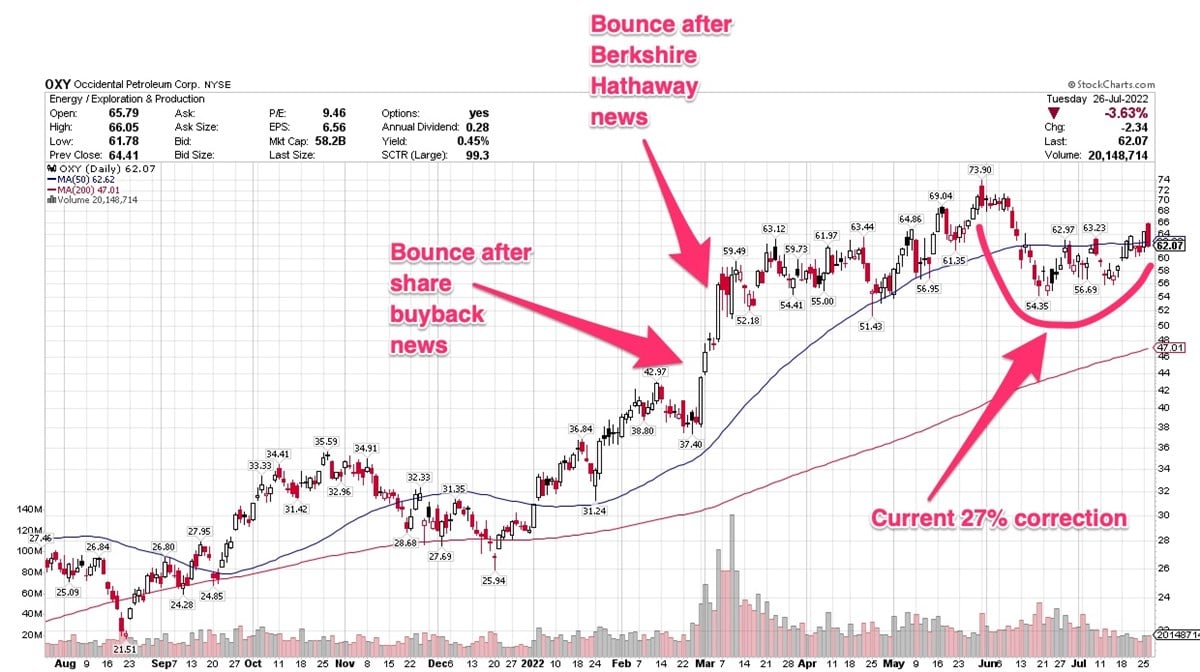Occidental Petroleum Leads Exxon Mobil, Chevron Ahead Of Next Week's Earnings Like Exxon Mobil (NYSE: XOM), Chevron (NYSE: CVX) and other oil-and-gas producers, Occidental Petroleum (NYSE: OXY) has been forming a potentially constructive consolidation, rather than falling off a cliff. Occidental...
By Kate Stalter
Our biggest sale — Get unlimited access to Entrepreneur.com at an unbeatable price. Use code SAVE50 at checkout.*
Claim Offer*Offer only available to new subscribers
This story originally appeared on MarketBeat

Like Exxon Mobil (NYSE: XOM), Chevron (NYSE: CVX) and other oil-and-gas producers, Occidental Petroleum (NYSE: OXY) has been forming a potentially constructive consolidation, rather than falling off a cliff.
Does that mean Occidental may be poised for more gains?
Let's take a look at the top three stocks with the heaviest concentrations within the S&P large-cap energy sector. Weightings are as follows:
- Exxon Mobil: 23.19%
- Chevron: 21.19%
- Occidental: 4.62%
Clearly, Occidental has less influence over sector-wide performance than its peers. But don't forget: Stocks frequently move in tandem with their broader industry or sector.
That's particularly true for stocks such as Occidental that constitute a smaller allocation within their industries or sectors.
Believe it or not, year-to-date, Occidental has returned 123.08%. That compares to Exxon Mobil's 49.93% return and Chevron's return of 28.95%.
Of course, that lower return for the two biggest stocks means that Occidental is also outpacing the broader sector, which has returned 34.95% year-to-date.
What's driving Occidental's price leadership?
For starters - and this may sound ridiculous - but with a market cap of $58.17 billion, Occidental is significantly smaller than either Exxon Mobil or Chevron, with market caps of $377.06 billion and $289.39 billion, respectively. While a company with a market cap of $58.17 is, indeed, very large, it's still more nimble than either of those giants.
Occidental has a beta of 0.98, while both its larger rivals have betas of 0.51. While all three of those companies are less volatile than the broader market, Occidental does tend to notch bigger moves. And remember: Volatility doesn't have to mean big downside moves. Upside volatility is also an important element of investing, and Occidental shareholders are seeing the benefit of that.
Recent Earnings Growth
Occidental is slated to report second-quarter results on August 2, after the closing bell. Analysts expect the company to earn $2.91 per share on revenue of $9.84 billion.
If met, those would mark significant increases over the year-ago quarter. According to MarketBeat earnings data, Occidental beat earnings and revenue estimates in each of the past five quarters.
The energy sector was the clear leader this year, until June, when lower gas prices and higher inflation combined to send sector stocks lower. It still remains the year-to-date leader, up 32.90%, while every other sector is down for the year.
Energy also boasts a gain in the past month, but so does every sector except communications services and materials.
That's some context for how the market may greet Occidental's report, if the company once again beats views.
It's no surprise that stocks often advance sharply if the top- or bottom-line results meet views, there's nothing scary buried in the fine print, and all the conference-call comments from company managers align with expectations of higher earnings ahead.
However, there have been plenty of companies lowering guidance lately. In addition, the trend of commenting on headwinds, such as inflation and supply-chain issues cutting into revenue or profits, are sending stocks downward.
Looking At The Chart
Occidental broke out of a cup-shaped correction in early January, then continued traveling higher in February. It pulled back to tag its 50-day average before rebounding off that line.
The stock bolted higher in late February, as the company said it would expand shareholder distributions and pay down debt. The company announced a dividend increase, to $0.13 per share, as well as a $3 billion share repurchase program.
Shares got another huge boost in early March, as Berkshire Hathaway revealed a $5 billion stake in the company.
Like everything else in the oil industry, Occidental peaked in early June, and began shaping its current correction. Thus far, it's corrected 27% from peak to trough and has been slowly shaping the right side of its base since late June.
On Tuesday, the stock closed 1% below its 50-day average, as it fell 3.63%, or $2.34, to $62.07. That downside action was in tandem with the broader market, which also declined Tuesday on concerns about the Federal Reserve's upcoming interest rate hike and an earnings miss from Alphabet (NASDAQ: GOOGL).
So how should you view Occidental's potential right now? In the near term, you might consider waiting for the earnings report before making a buy or sell decision. That's true with any stock. As noted above, these reports have the potential to send a stock lower, wiping out short-term gains.
However, even if a stock gaps up significantly after the report, that's a signal that institutional investors have conviction in their purchase, and aren't likely to bail out and take profits quickly. In other words, a gap-up can mean you have time to book some profits after an earnings report. 










